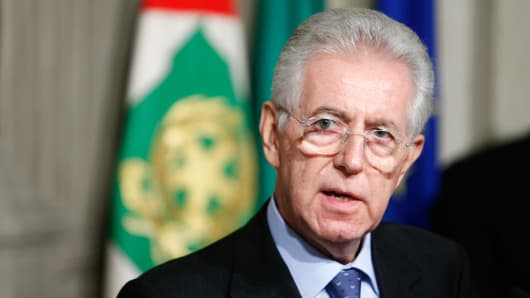Italy has escaped closer attention than Spain in recent weeks, but this could be due to technocratic Prime Minister Mario Monti selling its story better than the Spanish government.
And markets’ faith in Monti could leave whoever succeeds him in a tricky position.
Monti has said he won’t seek election again, but no credible alternative to his technocratic government has yet risen from the ashes. There have even been whispers that former Prime Minister Silvio Berlusconi (related slideshow: Silvio Berlusconi's Greatest Hits) could return to the fray.
The government is expected to miss its deficit targets for this year and next by a growing number of analysts. Targets for 2012 and 2013 are 1.7 percent and 0.5 percent of GDP, respectively, but Marco Stringa, European economist at Deutsche Bank predicts that the figures will come in at 2.3 percent for 2012 and 1.5 percent for 2013.
The IMF raised its estimates for Italy's national debt Monday, moving it up by 2.5 percent in 2012 to 125.8 percent, and by 2.6 percent in 2013 to 126.5 percent of GDP, as it cut global growth forecasts. And more bad news came from ratings agency Moody’s, which cut the credit ratings of Italian banks including Unicredit and Intesa SanPaulo on Monday, after downgrading Italy's sovereign rating last week.
Bond markets are showing an inextricable correlation between the fortunes of the two countries.
“The Italian data is as bad as Spain, the difference is that Monti’s a fantastic PR man compared to the PR disaster of the Spanish government. He also has some popularity. If that is lost, then that crucially exposes Italy,” Michael Gallagher, director of research at Idea Global, told CNBC’s “Squawk Box Europe” Monday.
Yet there are plenty of differences between the two countries – notably Italy’s industrial strength and its relatively low levels of household debt.
“Italy and Spain just have Latin inheritance in common. They are two totally different economies and political systems,” Marcello Benedetti, director of fixed income sales at Knight Capital, told CNBC.
“The Italian banking system is totally different from the rest of Europe – fortunately here we have something good.”
The period between November this year and March 2013 will be crucial for Italy’s political future, he believes.
“The end of the Monti era and the return to domestic politics in Italy is deeply unpopular in the market. If you don’t get the domestic political buy-in, as we’ve seen in Greece, you get a tricky situation,” Gallagher said.
The importance of Monti for Italy, after years of instability under Berlusconi, can be seen in the results of euro zone summits during his time in power.
During the painstaking negotiations over the future of the euro zone in June and July, Monti won what was seen as a victory by insisting on light conditions attached to the implementation of the European Stability Mechanism (ESM), the proposed permanent rescue fund. This should mean less direct intervention in policy by international creditors if Italy has to resort to the ESM.
This could be a Machiavellian maneuver on Monti’s part to try and set up a “second-best” economic policy for his successor, according to Stringa.
He described the policy as a “pre-emptive MoU” (memorandum of understanding - used to describe the agreement between bailed out euro zone countries such as Greece and their international creditors) as a risky but potentially helpful strategy “to enhance the credibility of Monti’s successor in a highly uncertain political (and economic) environment” in a research note.
“There should be no doubt that in our view, ‘first best’ remains ‘no intervention at all’. Indeed, our preferred path is still that Italy pulls through on its own strength, with local private domestic wealth coming to the rescue of the sovereign in case of need,” he reiterated.





